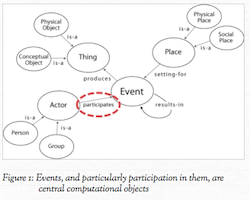 Nicholas Jenkins, in the Kindred Britain project, began his data excursion using the GEDCOM format and the OpenSource genealogical platform PHPGEDView. A logical and appropriate choice. He was working with individuals and was interested in their interrelations. The individuals in the dataset were manually chosen for their blood or marital relation to someone else in the dataset. Jenkins affirms the initial usefulness of PHPGEDView, but identifies that over time it became restrictive – much of which is a product of the data architecture of GED itself and so made a choice to leverage it into a SQL database. This was done to gain flexibility and to lend to a new calling to take relationships beyond nodes and edges to considerations of the temporal and spatial relationships as well.
Nicholas Jenkins, in the Kindred Britain project, began his data excursion using the GEDCOM format and the OpenSource genealogical platform PHPGEDView. A logical and appropriate choice. He was working with individuals and was interested in their interrelations. The individuals in the dataset were manually chosen for their blood or marital relation to someone else in the dataset. Jenkins affirms the initial usefulness of PHPGEDView, but identifies that over time it became restrictive – much of which is a product of the data architecture of GED itself and so made a choice to leverage it into a SQL database. This was done to gain flexibility and to lend to a new calling to take relationships beyond nodes and edges to considerations of the temporal and spatial relationships as well.However, the simple concept of exploiting GEDCOM as an exploratory networking environment brings much to a discussion of SNA research environments at a higher level. Genealogy is pitched as a lens for exploration of the relationships. A very useful lens. I have been pitching a genealogical approach to data integration and verification in manuscript census linkage – in a not dissimilar way to represent real life patterns. Having extrapolated from the GEDCOM format though, for further manipulation and exploration, there’s an interesting comment to be made here about whether the exploratory environment created has a reverse application to the traditional genealogical research process.
The concept of measuring ‘ability’ in Kindred Britain is an intriguing measure determined through linked open data in the ODNB. Although it demonstrates an admittedly overly simple one measure conceptually it raises some great consideration. Does not the modern and evolving genealogical research process encompass what Kindred Britain is demonstrating in a small scope?
Recently commercial providers of genealogical data have begun to harness more sophisticated visualisation process to allow for exploration (case in point ancestry.com or findmypast.com and their timelines of contemporary events). Bearing in mind that the creators of Kindred Britain did not intend to create a reusable platform (they leave that to Neatline and Hypercities – quite fairly) it is in this learning as to how we approach the conceptualisation of spatial-temporal-social relationships that shapes modern genealogical practice.
